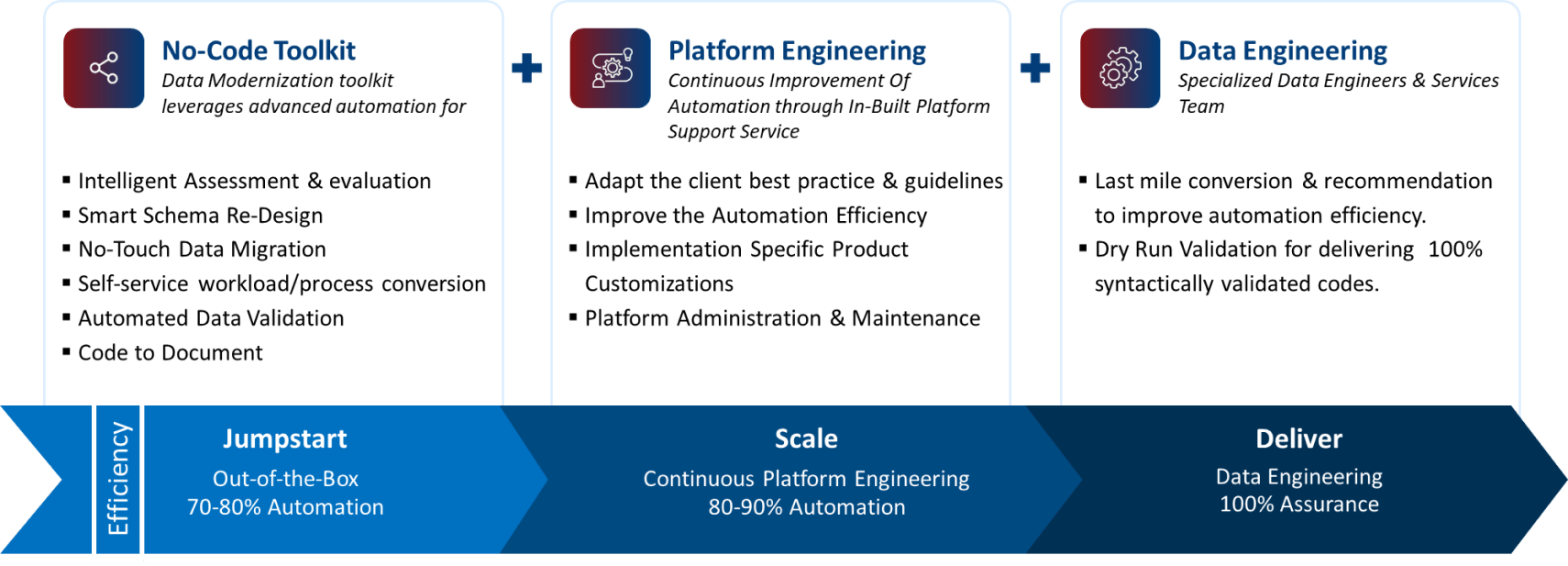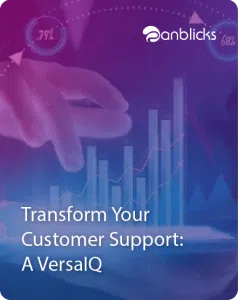
The Future of Data Modernization: How Accelerators are Transforming the Landscape

- Accelerators simplify data modernization by automating complex tasks and reducing implementation time
- They help tackle challenges like legacy integration and large-scale migration.
- Accelerators will keep driving innovation in data platforms and cloud.
In today’s digital landscape, organizations are increasingly recognizing the importance of modernizing their data infrastructures. In fact, WorldMetrics reports 80% of enterprises view data modernization as a pivotal factor influencing their digital transformation efforts. The traditional methods of data modernization are being replaced by the introduction of accelerators. These tools are reshaping the landscape by offering speed, efficiency, and cost-effectiveness, providing a sense of relief to organizations.
Understanding Data Modernization
Data modernization is the process of updating data architectures, infrastructure, and processes to meet the demands of the digital age. The goal is to ensure data quality, accessibility, and security while enabling organizations to harness the power of their data for actionable insights.
Key Challenges in Data Modernization
Data modernization is a necessity and a gateway to business innovation. Leveraging advanced analytics empowers organizations to drive innovation and maintain a competitive edge. However, to achieve this, they must surmount numerous challenges, including legacy systems that lack scalability, flexibility, and integration capabilities. Overcoming these obstacles is essential to unlocking the full potential of modern data infrastructure and cultivating a culture of innovation.
- Time-Consuming Processes: Modernizing data infrastructure often requires significant time investment, from planning to execution.
- High Costs Involved: The financial investment required for data modernization, including new technologies and skilled personnel, can be substantial.
- Scalability and Performance Limitations: Legacy infrastructure struggles to dynamically scale and efficiently manage resources.
- Integration and Interoperability Hurdles: Fragmented data sources and complex ETL/ELT processes hinder seamless data flow.
- Advanced Analytics and AI Adoption Barriers: Limited access to modern tools and data silos impede comprehensive analytics.
- Data Quality and Governance Issues: Inconsistent data standards and regulatory compliance challenges affect data reliability.
- Agility and Innovation Constraints: Rigid architectures and slow deployment cycles stifle rapid adaptation and innovation.
The Solution: Accelerators led Data Modernization
These pre-built frameworks, tools, or platforms are designed to streamline the data modernization process. They leverage best practices, automation, and pre-configured solutions to reduce the time and effort required to modernize data systems. Here’s how accelerators are transforming the landscape of data modernization:
- Speeding Up Transformation: Accelerators significantly reduce the time required for data modernization by automating repetitive tasks, providing pre-built templates, and using advanced algorithms to streamline data migration and integration. Traditional methods can take months or even years, but accelerators can reduce this timeline to weeks. This allows businesses to realize the value of their data modernization initiatives faster.
- Reducing Costs: Accelerators help reduce costs by minimizing the need for custom development and leveraging automated processes. This cuts down on labor costs and reduces the risk of errors and rework, further driving down overall expenses.
- Enhancing Data Quality and Governance: Built-in data quality checks, validation mechanisms, and governance frameworks within accelerators ensure the data integrity, accuracy, and compliance throughout the modernization process, providing a sense of security and confidence to organizations.
- Leveraging Advanced Analytics and AI: Accelerators provide the foundation for integrating advanced analytics and AI capabilities into the modernized data platform. This empowers organizations to perform real-time analytics, predictive modeling, and machine learning, unlocking new opportunities for data-driven decision making, innovation, and growth.
The Future of Data Modernization with Accelerators
- Stay ahead of the competition: By leveraging modern data platforms and advanced analytics, businesses can gain a competitive edge in the marketplace.
- Drive innovation: Data modernization fosters a data-driven culture fueling innovation and the development of new products and services.
- Achieve their business objectives: Modernized data empowers organizations to make data-driven decisions aligning with their strategic goals and objectives.
Anblicks: Your Trusted Partner for Data Modernization

Benefits of Data Modernization
- Rapid Transformation: Reduce data modernization efforts from years to 26 weeks with Anblicks’ proven accelerator and framework.
- Cost Savings: Modernizing data platforms can lead up to 40% in overall IT operations cost savings
- Enhanced Operational Efficiency: Streamlined data processes reduce redundancies and improve workflow efficiency.
- Increased Agility and Innovation: Modernized data platforms enable quicker adaptation to market changes and foster innovation.
- Better Customer Experience: Accurate and accessible data leads to more personalized and efficient customer interactions.
Data modernization is no longer a luxury; it’s a necessity for businesses that want to thrive in the digital age. And the future of data modernization lies in the adoption of accelerators. By adopting these powerful tools and frameworks, organizations can unlock the true potential of their data and achieve their strategic goals. Anblicks is here to help you on your data modernization journey. Contact us today to learn more about our industry-specific accelerators and how we can help you transform your business.

John Vallogia is a marketing leader at Anblicks with a passion for leveraging data to achieve impactful results. He boasts nine years of experience within the software industry, where he has excelled in crafting winning go-to-market strategies and developing content that resonates with target audiences. His extensive background in data & analytics equip him with a deep understanding of advanced AI solutions and the Snowflake and Databricks platforms. This knowledge allows him to tailor marketing efforts for maximum impact. John holds a Master’s in Business Administration from Anna University.







